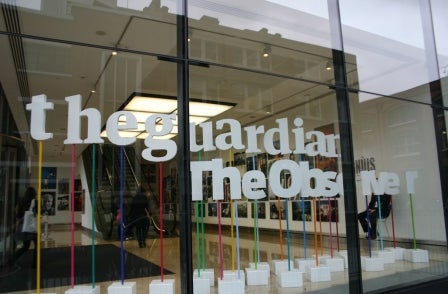
Guardian Media Group operating losses have escalated by a further £10m to £68.7m for the year to the end of March.
The Guardian and Observer publisher briefed in March that operating losses were expected to be £58.6m. But the FT reports that the final audited figure, to be released on Wednesday, will be even higher.
GMG declined to comment, but Press Gazette understands that the FT’s numbers are correct.
In March GMG announced that 250 staff were to be cut as it sought to cut spending by 20 per cent. According to the Financial Times, GMG has exceeded this target – with 70 journalists among those taking redundancy.
Again according to the FT, GMG’s pre-tax loss figure will be even higher – £173m – fueled by £20m of restructuring costs (including severance payments) and an £80m write down in the value of its stake in business publisher Asential (formerly known as Emap).
GMG’s 22.4 per cent stake in Ascential is said by the FT to be worth £219m.
As of March, GMG’s investment fund (mainly from the proceeds of the sale of its stake in Autotrader) stood at £735m.
GMG operating losses were £19.1m for the year to the year to April 2015 on turnover of £214.6m.
Announcing Alan Rusbridger’s departure as editor in December 2014, GMG chairman Neil Berkett said his successor as editor “will inherit a global media organisation in very strong health and with clear prospects for further growth”.
But since then GMG has been hit strong competition for digital advertising from digital giants such as Google and Facebook and suffered from a sharp decline in print advertising.
Some Guardian insiders blame the title’s current dire financial position on the expansion under Rusbridger and former chief executive Andrew Miller which saw total staff numbers increase by 480 over three years to 1,950.
Editorial expansion has been mainly in Australia and the United States. As of 2015, Guardian News and Media had 968 people who were defined as “core editorial staff”.
In June, The Guardian saw its highest ever website traffic figures: an average of 10.3m unique browsers per day from around the world.
In print, The Guardian is now the lowest selling UK-wide national newspaper with an average daily sale of 172,000.
In May, Guardian editor Alan Rusbridger resigned from the Scott Trust and gave up on a plan to chair the body which owns The Guardian and Observer. He was opposed by his successor as editor, Katharine Viner, and by chief executive David Pemsel.
Viner and Pemsel are currently rethinking The Guardian’s business model and considering whether to include some element of paid-for online content as part of the membership scheme.
Viner has been appealing to readers to support The Guardian by paying £5 a month.
Guardian members benefit from advance access to Guardian events and they can also access exclusive live broadcasts.
Email pged@pressgazette.co.uk to point out mistakes, provide story tips or send in a letter for publication on our "Letters Page" blog
